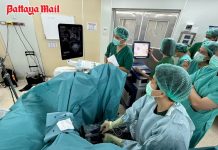There is only December 30 and 31 left in which to pay to get the discounted Check-up Packages in my hospital. However, as long as you have paid before December 31, you have till February 28 to actually have the physical examination.
The usual request is “I want everything.” And by that they mean blood testing. If I told them that sitting on my desk is the “Manual of Use and Interpretation of Pathology Tests” which is almost 400 pages and there are about five tests per page. Imagine the bill for all that lot! But I doubt if many of you need Basement Membrane Antibodies to be done for any reason.
There is also, in the collective subconscious, interest in a “whole body scan” which is thought of as some magical device that you can walk into in one end and out the other and a print-out will tell you (and us) exactly how you are inside and out. Every organ! Even Willy the Wonder Wand! Unfortunately, this is stretching the truth somewhat. Machines like that are only seen in Star Trek movies.
However, there is the PET scan, which is a specialized form of whole body scanner, that can give an indication of what is going on inside.
PET stands for Positron Emission Tomography and is a type of nuclear medicine imaging. Nuclear medicine is a subspecialty within the field of radiology that uses very small amounts of radioactive material to diagnose or treat disease and other abnormalities within the body.
Nuclear medicine imaging procedures are noninvasive and usually painless medical tests that help physicians diagnose medical conditions. To be able to produce the images in a PET scan, you have to have radioactive materials, called a radiopharmaceutical or radiotracer, and these are injected into your veins. The radioactive material has a very short life and is usable for only about two hours, though it will take a day before you have excreted it all.
The radioactive energy is detected by a device called a gamma camera, a (positron emission tomography) PET scanner. These radiology devices work together with a computer to measure the amount of radiotracer absorbed by your body and to produce special pictures offering details on both the structure and function of organs and other internal body parts.
The PET scanner is most usually used in cancer medicine and can demonstrate a ‘hot spot’ to show up the primary cancer, stage a cancer, show any metastases (spread), and even show whether cancer treatment modalities are working. For example, the PET scan can show the difference between scar tissue and active cancer tissue.
The benefits provided by PET scans are primarily because the information provided by nuclear medicine examinations is unique and often unattainable using other imaging procedures.
For many diseases, nuclear medicine scans yield the most useful information needed to make a diagnosis or to determine appropriate treatment, if any.
Nuclear medicine is much less traumatic than exploratory surgery.
By identifying changes in the body at the cellular level, PET imaging may detect the early onset of disease before it is evident on other imaging tests such as CT or MRI.
The risks are very low. Because the doses of radiotracer administered are small, diagnostic nuclear medicine procedures result in minimal radiation exposure. Thus, the radiation risk is very low compared with the potential benefits.
Nuclear medicine has been used for more than five decades, and there are no known long-term adverse effects from such low-dose exposure.
Allergic reactions to radiopharmaceuticals may occur but are extremely rare.
Injection of the radiotracer may cause slight pain and redness which should rapidly resolve.
Women should always inform their physician or radiology technologist if there is any possibility that they are pregnant or if they are breastfeeding their baby.
Can you get this kind of scan here? Yes, at Wattanosoth Hospital in Bangkok, and it costs around 60,000 baht last time I asked. However, if you purchase a Chivawattana personal health insurance card (available at Bangkok Hospital Pattaya) it has a discount for the PET scan (as well as many other benefits). Well worthwhile looking into if a PET is on the agenda.




